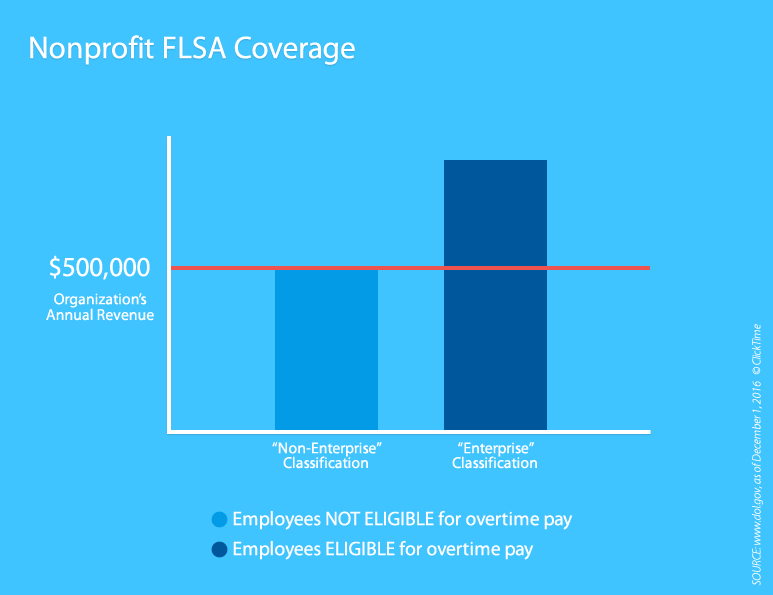Nonprofit Enterprise Classification
Nonprofit employees are considered eligible for overtime pay by the FLSA if the nonprofit that they work for is classified as an enterprise. In order for a nonprofit to be classified as an enterprise, it must have $500,000 of annual revenue. If this threshold is met, then the nonprofit’s employees are covered by the FLSA and are eligible for overtime pay.

Individual Overtime Eligibility
If a nonprofit does not qualify for enterprise status, some of its employees still may be eligible for overtime pay. The FLSA covers employees whose duties have to do with interstate commerce.
Employees that engage in any of the following activities in their daily work are eligible for overtime pay:
- Receiving or sending interstate mail (including electronic)
- Making out-of-state phone calls
- Ordering or receiving goods from a supplier who is located in another state
- Performing bookkeeping and handling transactions for interstate trade and purchasing
In order for an employee to be covered by the FLSA, they must perform these duties very frequently in their workday. If they only are engaged in these activities occasionally, they will most likely not qualify for overtime pay.
White Collar Overtime Exemptions
Workers who qualify for FLSA coverage are not always eligible for overtime pay. There are some exceptions in white collar jobs that make certain people ineligible for overtime. A few of these exceptions are employees must be paid at least $913 a week, be paid the same salary regardless of their output of work, and the duties they perform regularly must meet their position definition:
Administrative
The employee’s primary duty must be non-manual work related to management or general business operations of their employer or employer’s customers. Their work must include exercise of discretion and independent judgement with respect to matters of significance.
Executive
The employee’s primary duty must be managing the enterprise, a recognized department of the enterprise, or a subdivision of the enterprise. They must regularly direct the work of at least two full-time employees. They must have the authority to hire and fire other employees or have significant say in the change of employees’ statuses.
Professional (Learned)
The employee’s primary duty must be work that requires advanced knowledge, is intellectual in character, and requires constant exercise of discretion and judgement*. This advanced knowledge must be in a field of science or learning. This advanced knowledge must be acquired by prolonged course of intellectual instruction. *Please note, this overtime rule does not apply to teachers, doctors, or lawyers.



